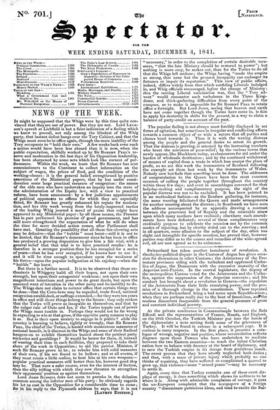The popular feeling is not always most forcibly displayed in
set forms of agitation, but sometimes in irregular and conflicting efforts towards a common object of so wide a nature that all parties and classes bend towards it. Thus it is with the waxing distress among the people and the general desire to arrest its growth. That the distress is growing, is attested by the increasing numbers who beset the ministers of poor-relief; by the various towns that newly appear, like Blackburn today, as clamourers for aid under the burden of wholesale destitution ; and by the continued withdrawal of masses of capital from a trade in which loss usurps the place of profit, as we see this week the ironmasters of Scotland following the example set them last week by the ironmasters of Wales. Nobody now but feels that something must be done. The addresses of congratulation to the Queen have been the most common occasion of calling the people together throughout the country within these few days ; and even in assemblages convened for that holyday-making and complimentary purpose, the sight of the popular distress was not to be excluded. It has been pointed to in no methodical fashion—at the Renfrew gathering, for instance, the same meeting felicitated the Queen and made arrangements for another meeting about the distress ; in Southwark we have seen the address accompanied by an appendix drawing a contrast between the procreant bed of Royalty and the miserable straw upon which many mothers have reclined ; elsewhere such amend- meats have been defeated ; several of these complimenters very creditably propose to celebrate the occasion not by the common modes of rejoicing, but by charity doled out to the starving ; and in all quarters, some allusion to the subject of the day, often too slight and intangible for specific mention, has proved that, however parties may differ as to the causes and remedies of the wide-spread evil, all are now agreed as to its existence.


























